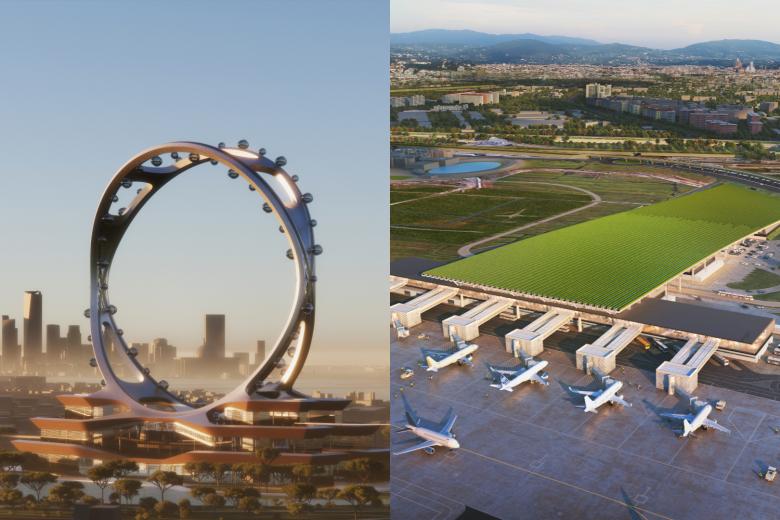UNStudio has shared images of their concept for a spokeless Ferris wheel in Seoul, while Rafael Viñoly Architects has revealed their design of a vineyard-topped terminal for Aeroporto Amerigo Vespucci in Florence.
Seoul Observation Wheel
Amsterdam's UNStudio, working with Arup and local firm Heerim Architects, has revealed their “vision proposal” for the new Peace Park Wheel initiated by the Seoul Metropolitan Government for Sangam World Cup Park. The park was built in 2002 to commemorate that year's Korea-Japan World Cup Games, and the 180-meter (590-foot) Ferris wheel — tentatively named “Seoul Twin Eye” — would be located next to the World Cup Stadium, designed by Ryu Choon-soo for that World Cup.
The novelty in UNStudio's proposal is the spokeless design made up of two intersecting rings: one holding pods on outside tracks, one holding pods on inside tracks. Each of the 64 pods would carry 20 to 25 people — 1,400 people at once, twice the capacity of the London Eye. Although the diameter of Seoul Twin Eye is 180 meters, it would be lifted 40 meters (130 feet) above a cultural complex with exhibition, performance, retail, and dining functions, reaching a height of 220 meters (720 feet), almost half the height of Seoul Sky, the observatory atop Lotte World Tower, the tallest building in Seoul. Completion of the Ferris wheel is planned for 2028.
Aeroporto Amerigo Vespucci
New York's Rafael Viñoly Architects has unveiled their design for the new international terminal at Aeroporto Amerigo Vespucci, located northwest of Florence, Italy. The 50,000 m2 (540,000-sf) terminal is expected to handle close to six million passengers annually and will be linked to the city center via a tramway that was completed five years ago. The terminal would be located east of the existing terminal, but it would involve turning the existing runway 90 degrees, a move the architects contend would “lengthen the inadequately short runway” and reorient planes away from the hills that currently restrict their movements.
The most striking aspect of the design by architect Román Viiñoly, son of the late Rafael Viñoly, is covering the sloping 19-acre (7.7-ha) roof with a vineyard: “38 rows of productive vineyards,” per the architect, that would help earn the terminal a LEED Platinum certification and “[symbolize] Italy's rich traditions and innovative spirit.” The grapes, cultivated by a “leading vintner from the region” would be crafted into wine “in specialized cellars beneath the terminal's roof” — an odd and unexpected pairing (pun intended) of tourism and industry. Phase one of the terminal is planned for completion in 2026, with phase two in 2035.
Related articles
-
-
-
Center for Inclusive Growth & Competitiveness for TAPMI
The Purple Ink Studio | 27.10.2025







